
Sep 25, 2023
Understanding Soft Skills in the Workplace
“Good manners will open doors that the best education cannot.” – Clarence Thomas
When Joey graduated with a business degree from a top-rated California university, he assumed his future was secure. He had a 4.3 GPA, scored high on every exam and wowed his professors with his written work. He was the first to raise his hand in class and always the last to leave. He spent ample time at the library, reading every book he could get his hands on. An eager student, he found himself even more eager to secure a high-paying job right out of college. But to his dismay, he had trouble landing an interview. Despite his stellar resume, the phone did not ring. Frustrated and discouraged, Joey spruced up his resume, hoping that might do the trick. At last, he landed a couple interviews. But upon talking with his potential employers, he felt out of his league. Their pointed questions blindsided him.
“Would you consider yourself a team player?”
“How well do you work under pressure? What would you do if a deadline arose and you were not fully prepared?”
“Are you generally flexible, able to adapt to any situation or curve ball thrown your way?”
Joey stumbled over the questions, doing the best he could. Sweat beaded on his forehead, and he felt his heart racing. He’d held a fast food job in high school but hadn’t set foot in the workplace since. He’d kept meaning to volunteer or get involved in extra-curricular clubs at school, but he’d been too busy holed up in the library studying. He’d assumed his outstanding GPA would make him a standout, but maybe he’d been wrong.
As it turns out, Joey is not alone. He is one of millions of college students who find themselves struggling to land jobs, or even an interview, after college graduation, despite their good grades. On paper, they look great, but the grades are not always enough. The missing factor in many cases?
Soft skills.
Many students may be unfamiliar with the term soft skills. Generally speaking, soft skills are often associated with one’s “EQ” or Emotional Intelligence Quotient. This includes the way people interact with others as human beings through their personality traits. These traits could include social graces, communication, language, personal habits, friendliness, management skills or leadership skills. Soft skills contrast to hard skills, which are generally easily quantifiable and measurable. Some hard skills could include software knowledge, technical skills or basic plumbing skills.
The idea of soft skills might seem like a fresh concept, but it is at least as old as ancient Greece. When Plato wrote about education in his work, The Republic, he contended that a universal curriculum requires a balance of education in physical education, the arts, math, science, character and moral judgment. He also backed the idea of learning outside the classroom, saying, “By maintaining a sound system of education and upbringing, you produce citizens of good character.”
Traditional institutions once dispensed this sort of training. However, families and religious institutions have weakened over time. Today, training in soft skills is more needed than ever. The need to develop healthy, socially appropriate and mature responses to workplace stress and interpersonal reactions has become increasingly evident to business owners, executives and human resources personnel in recent years. Yet according to a Gallup poll, while a whopping 92 percent of college educators feel their students are prepared for the workplace, only 11 percent of employers feel they actually are. And 42 percent of those employers believe soft skills make up the biggest skills gap.
If this all sounds like discouraging news to you, fear not. You probably have more soft skills under your belt than you realize. Those Little League games you coached? The babysitting or dog-walking job you picked up to earn some extra cash? None of it was in vain. The important thing is to recognize the soft skills you gained along the way and to highlight them on your resume and in your interview.
So just what sort of skills do managers desire? According to a recent Career Builder survey, here are the top ten:
Strong Work Ethic – Are you efficient with your time?
Dependable – Will you show up on time and do what you say you’ll do?
Positive Attitude – Will you complain or portray yourself as a victim, or will you make the best of things?
Self-Motivated—Can you problem solve on your own?
Team Oriented – Will you adopt a “my way or the highway” attitude or will you partner with others to be part of a productive team?
Organized – Will you plan your time well? Can you handle multiple challenging situations at once?
Works Well Under Pressure – Can you meet deadlines? Do you have a sense of urgency? Can you handle uncertainty, tension and stress?
An Effective Communicator – Are you clear with your information and directions?
Flexible – Can you adjust to new situations and change course when needed?
Confident – Do you trust yourself to make decisions, or do you hesitate?
A strong GPA and resume is great, but soft skills will really make you stand out from the rest!
To learn more, purchase your copy of College to Career today.
So let’s get started today!


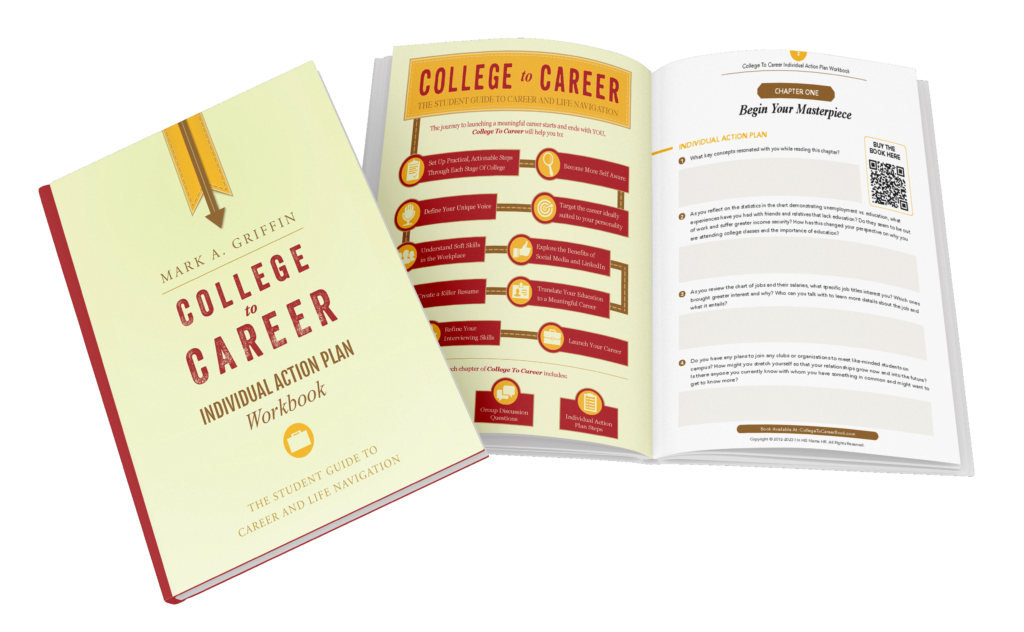

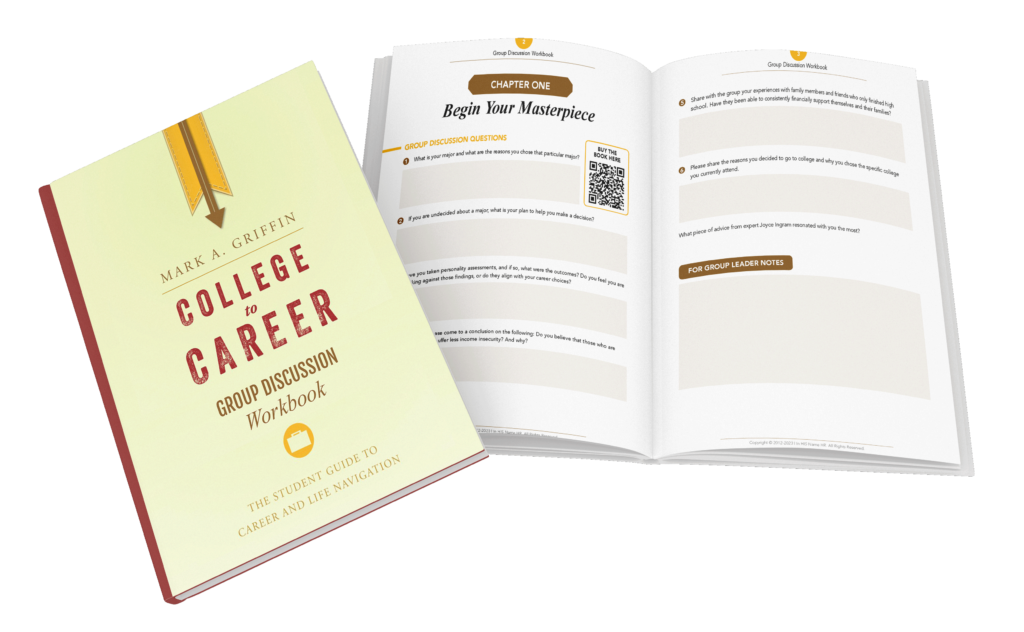
Mark A. Griffin | Career Coaching, Christian Higher Ed HR, Job Search Tools

Sep 15, 2023
Begin Your Masterpiece
Years ago, after presenting at a week-long business conference, I struck up a conversation with the hotel clerk. She reminded me of my daughter – young, vibrant, and cheerful, with a welcoming smile. She introduced herself as Ashley.
“How long have you worked here?” I asked her. “Are you taking college classes?”
“Yes. As a matter of fact, I graduate in a few weeks,” she replied.
“What is your major? And what do you plan to do after graduation?” I asked next.
Ashley’s smile faded a bit. “I’m majoring in Psychology, and quite frankly, I have no idea what I’m going to do. No one has told me what I could do with this degree. All I wanted was to get the degree behind me.”
I was saddened by Ashley’s answer, but not terribly surprised. I’d heard the same words uttered many times over the years. Four (or more!) years of hard work, late-night studying and football games would all come to an end as students proudly flipped their tassel to the other side. But beyond that big day, very few had a solid plan. After spending thousands of dollars on an education, they would tragically enter the workforce with only a hope and a prayer.
And a whole lot of debt.
When Ashley told me the name of the university she attended, my heart sank. I knew it was prestigious and expensive. By graduation, she would have spent at least $100,000 for an education. Yet she felt clueless as to where to go next.
Recent statistics show that a four-year private school college education will cost students roughly $130,000. For in-state students completing a four-year education at a public college, that number drops to roughly $40,000. Students who spend two years at a community college and then two years at a private college will look at spending roughly $75,000 on tuition. Statistics also show the average student debt for a four-year bachelor’s degree hovering at nearly $35,000. A whopping 64 percent of students with a four-year college degree will walk away with some sort of student debt. And the average debt for a four-year private school education? Nearly $60,000. For perspective, that’s 12,000 Starbucks grande lattes, 6,000 Chipotle burritos and 4,000 movie tickets.
Yikes.
Like Ashley, you might find yourself near the end of your college career, buried in papers, exams and projects. With graduation day just around the corner, your excitement might be overshadowed by concerns over your looming future. Will you be able to afford to pay off your student loans? More importantly, will you be able to find a job that supports your lifestyle and allows you to pay off those loans? Things feel uncertain, unpredictable. The stakes feel high. You don’t want to let your parents down, yourself down. Moreso, you don’t want that hard-earned, pricey college degree to go to waste.
That’s where we come in.
College to Career was created just for you. We know the anxiety, the mounting pressure you face each day as you work so hard to succeed. That’s why we’ve provided all the tools you need to take those next steps. This life-changing book will discuss key strategies and concepts, including:
*Navigating social media
*Creating an outstanding LinkedIn profile
*Developing key accomplishments for your resume
*Finding meaningful internships
*Networking with influential professionals who are able to help you find the right career after you graduate
Believe it or not, each of these are easy to attain and paramount to your success. Employment opportunities will start pouring in when you are connected to 50-100 professionals prior to graduation. With the right tools at your fingertips, you’ll have a sweeping advantage over your peers at the end of your college career. Equally important, you’ll have peace of mind, knowing your hard-earned degree won’t be going to waste.
I’m not sure what Ashley is up to today. I’ll never forget that perky smile-turned-frown as she lamented about her impending post-college plans. I wish I’d had more time to chat with her and assure her about her future. I wish I could have offered her what I offer you today – the tools to turn your college degree into success.
If you’d like to journey with me, I’d be happy to be your guide, navigating you through this next step of your life. Without a proper navigational guide on a road trip, one might find themselves lost, frustrated, out of gas and at the end of an unfamiliar dead-end dirt road. But with the right navigational tools, one will end up on the right path. And that’s just what I want for you.
So let’s get started today!





Mark A. Griffin | Career Coaching, Christian Higher Ed HR, Job Search Tools
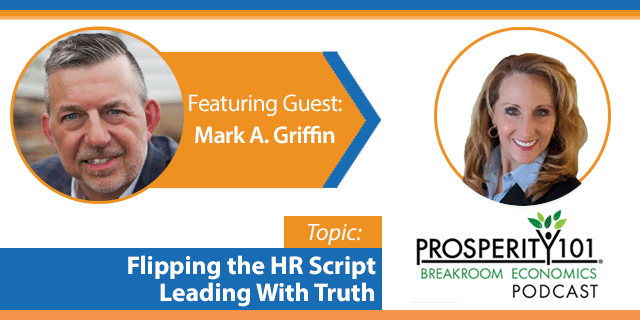
Sep 5, 2023
The workplace. Where employers and employees converge. What is the culture of your organization? Is it Woke? Or Awake? What is the difference? Terms like DEI, ESG, and CRT have been in the news, but what do they mean to you – and what is an appropriate response for a faith-based workplace leader?
Host Linda J. Hansen is the Founder & President of Prosperity 101 Podcast, LLC, and the creator of the Breakroom Economics™ program. She is passionate about helping to enhance communication between employers and employees, especially regarding basic economics of job creation and business prosperity. Her original book in the Prosperity 101™series, entitled Prosperity 101 – Job Security Through Business Prosperity™, and the accompanying Workshop Facilitator Guide, were first published in 2009, and have been widely used across the country.
Download and Listen on iTunes Here
Mark A. Griffin is paving the way for employment opportunities without fear of religious discrimination even as the government seeks to reshape the business landscape. Mark stands in the gap and lives out his Kingdom mission by providing an alternative Bible-based DEI program for Christian nonprofits, churches, ministries, and camps. He also serves Christian-owned for-profit organizations looking for wiser choices in this space.
Listen in and glean beneficial information for your organization. You can contact Mark through his website, inhisnamehr.com, or find him on Twitter @inhisnamehr.
Mark A. Griffin | Christian Higher Ed HR, Human Resources, Podcasts

Aug 28, 2023
Divorce remains one of the most prominent issues in our society. While rates have technically declined since 2000, roughly one in two marriages still end in divorce. Second marriages stand an even slimmer chance, with a 63% failure rate; and third marriages have the worst chance of success at 73%.
Take an inventory of your closest friends and family, and chances are that you know several couples who have divorced. Many issues contribute to this problem, with lack of communication cited as the number one culprit behind it. Infidelity comes in second, with 60% citing it as their reason for splitting. And domestic abuse is next, with 24% claiming it ended their marriage. 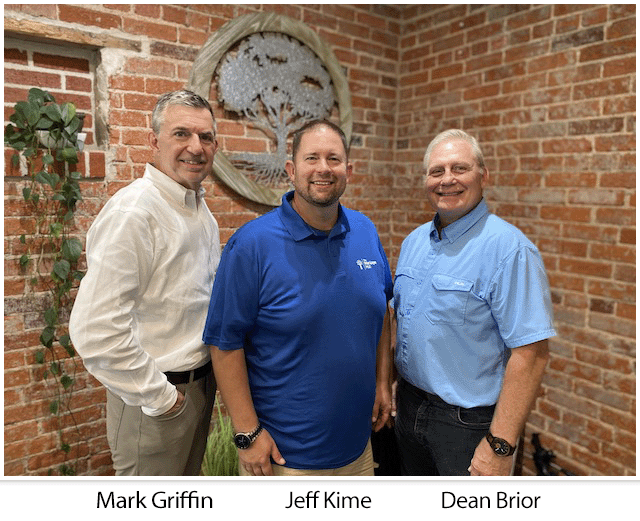 Many demographics play a part as well. For instance, those living below the poverty line have a higher chance of divorce versus college-educated couples, who are more likely to stay married. With that said, while divorce can impact anyone at any age, recent studies show the average age is mid-40s, the time when most people are at the peak of their career. And when you look at religious communities, there isn’t a single one that’s immune, though evangelical Protestants factor most prominently into these unfortunate statistics.
Many demographics play a part as well. For instance, those living below the poverty line have a higher chance of divorce versus college-educated couples, who are more likely to stay married. With that said, while divorce can impact anyone at any age, recent studies show the average age is mid-40s, the time when most people are at the peak of their career. And when you look at religious communities, there isn’t a single one that’s immune, though evangelical Protestants factor most prominently into these unfortunate statistics.
With so many effected by divorce, it’s crucial to understand how it can impact the workplace. Recent data confirms that divorce-related stress costs employers $300 billion per year. For example, the average employee loses 168 hours of worktime in the first year following a failed marriage. And it only makes sense that those going through the process are prone to being distracted, unfocused, and unmotivated, resulting in diminished productivity.
In one recent study, nearly 44% of those going through a divorce admitted that it had negatively impacted their work. Think about it. They can make more mistakes on the job. They can cause issues with colleagues and be prone to being more sensitive than normal. They can also take multiple sick and personal days to attend court custody cases and meetings with lawyers. In short, things can quickly go downhill for employees ending their marriages, and the result can be catastrophic financially, personally, and professionally.
As leaders, we know the converse is just as true: When our people are happy with their lives outside the workplace, they do better on the job, contributing at a higher level, prospering their organization, and impacting their communities in a positive manner. Yet we can only impact our corporate environment, not anyone’s individual homelife.
So what is the solution? Can we do anything to support those employees headed for divorce?
My research says yes.
Most organizations already provide health benefits for employees. High-performing employers offer their workers not only health but wellness benefits, which can be related to fitness, smoking cessation, diet coaching, and more. They also maintain Employee Assistance Plans (EAPs), which typically offer therapy for employees and family members concerning relationship issues or ailments connected to depression, anxiety, grief, and loss. Some may include couples therapy as well, but some do not.
Offering great employee assistance programs can yield lower turnover rates, higher levels of job satisfaction, decreased absenteeism, and an overall happier and healthier work environment.
Recently, I had the opportunity to spend time with good friends Dean Brior and Jeff Kime. Dean is a successful CEO, business owner, and entrepreneur who has successfully led hundreds of employees. As such, he has witnessed the toll divorce takes on people, not just at home but in the workplace.
Currently, Jeff is the Executive Director and Dean is director of development for The Marriage Hub.
Founded in 2004 by Dr. Bruce McCracken, The Marriage Hub seeks to provide biblically based marriage-building experiences for couples of all ages and stages. Their bold vision is to see divorce eradicated from our society by helping couples repair broken relationships so they can lead happy and fulfilled lives both inside and outside the workplace.
Mark: Jeff, it’s great meeting with you today, brother. I am excited to share with our readers what you’re doing. My first question is simple. How does divorce affect the workplace, and why should human resource professionals sound the alarm bells?
Jeff: Rosemary Frank, a certified divorce financial analyst, reported that divorce impacts the entire workplace in four major areas. The first is a loss of concentration when the employee is going through the divorce personally. This hits 40% in the first year, and slowly drops to 10% all the way in year four following the divorce.
The second is disrupted coworkers. We’re all social creatures, so if someone is hurting, we listen to their story [and] try to console them, resulting in those employees suffering a drop in productivity. It peaks at 4% in the first year, which continues for up to five years.
The third is that the employee going through the divorce misses workdays. Those days can be due to child custody hearings, meetings with attorneys, having to deal with childcare that was typically shared with a spouse – you name it. The average employee misses 9% of their workdays when going through a divorce.
The final area is an increase in usage of health benefits, which as we all know, ends up costing the employer in the long run. Added stress – needing to add kids to health plans, etc. – typically increases health-related expenditures by 10.4% while going through a divorce.
Adding all of these factors together, Rosemary Frank concluded the average business owner ends up paying an additional $85,934 in lost revenue for a business when one of their employees goes through a divorce. And if the person is in management, it could go even higher!
Mark: There are many great counseling programs out there, yet many couples never take advantage of them. What do you think makes The Marriage Hub unique and so successful?
Jeff: Mark, the typical couple going through marital challenges looks at counseling or their church as their first line of response. The challenge is that while both of those are potentially helpful options for a couple, it’s not the most effective option for a couple going through marital crisis. They need more than a one-hour session every other week with a counselor; they need more than the training a pastor has received in handling these specialized situations. And that’s where The Marriage Hub comes in.
We offer 20+ hours in a three-day Marriage Intensive Retreat for these couples in crisis. We then offer a 15-week follow-up course after the intensive. The national success rate of counselors working with a couple in crisis is only 25%, and the average couple flames out after two and a half sessions. It’s not enough, whereas here at The Marriage Hub, we’ve maintained an 85% success rate working with couples in crisis by giving them the time and personal care they need to navigate these challenging times – all performed by one of our highly trained coaches.
Mark: Dean, What have you personally witnessed in your years of experience as a leader in the workplace? Any specific examples regarding employees and the toll that divorce has taken on productivity, etc.?
Dean: Unfortunately, what Rosemary says rings true. I’ve seen this countless times: someone who was a business rockstar loses their mojo during a divorce. It’s not that the person is bad; it’s just the emotional landslide a divorce creates. That causes them to lose their focus and fail to perform at the same level they normally did.
Mark: Why do you believe The Marriage Hub can become a critical component of organizations’ human resources department?
Dean: When the HR department hears about challenges going on in an employee’s life, when they start to notice things going sideways and sit down to chat about job performance or any other concerning issues they see at work, they often learn that it’s challenges at home that are causing these work difficulties. Here at The Marriage Hub, we can become a resource to help those struggling employees. As the employee’s marriage is transformed, so is their entire countenance and ability to perform their job the way God intended for them.
Mark: How have you seen, firsthand, The Marriage Hub make a lasting impact on employees’ workplace efforts and personal relationships outside the workplace?
Dean: One example is a couple who had come to our program when on the brink of divorce. The lady was a key employee at a local business, and her employer had heard about our program. He called us up and said he wanted to pay for the entire program for her and her husband. Over the course of the weekend, the transformation was not only profound in their marriage, but for eternity as well! The wife came to saving faith in Jesus Christ, and their family is now stronger than ever.
Mark: What might you say to an HR professional who is skeptical about the program and does not see a need for such a thing in the workplace?
Dean: I’d encourage them to reach out to other HR friends to see whether the data I shared earlier plays out in the real world. I think they’ll quickly realize that taking care of the whole person – including their marriage – is one of the greatest ways to build their business. Business is run by people, and people in a good place emotionally, socially, and spiritually make the best businesses and communities.
Mark: Lastly, what inspired you to get involved with The Marriage Hub? Can you share any personal stories with us?
Dean: Nancy and I have been married for 46 years. Our first six years were tough, as we were married in college and had to grow up together. We would have benefited from a ministry such as The Marriage Hub back then. We have celebrated many marriages through the years and seen our share of divorces happen. Most of those divorces did not have a resource like The Marriage Hub. Our mission is to see the ministry grow to the point where any couple in need can call us and get help.
Mark: Thank you, Dean. My hope and prayer are that more organizations will see the need for programs such as The Marriage Hub, and that, ultimately, marriages will be restored. In the words of Oswald Chambers when discussing the Sermon on the Mount, “The knowledge of our own poverty is what brings us to the proper place where Jesus Christ accomplishes His work.” When we recognize our shortcomings and surrender to Christ, great things can take place. The workplace should be joyful. The joy and passion we bring to the workplace should be a reflection of what we experience in our personal lives, an ultimate reflection of our lives, as well as a great setting to share the gospel with others. I am grateful to you, Dean, for your work and pray that we see miraculous things in the days ahead.
___________
Concerned about the HR programs at your organization? The benefits of having a trusted partner to guide you and your team to excellence are invaluable. Contact us today. You—and your employees—will be glad you did.
Rise with us by implementing our high-performance remote human-resource programs to help find great people! E-mail us here.
Mark A. Griffin is president and founder of In HIS Name HR LLC. Connect with him on LinkedIn and Twitter
Mark A. Griffin | Blog, Christian Higher Ed HR, Human Resources
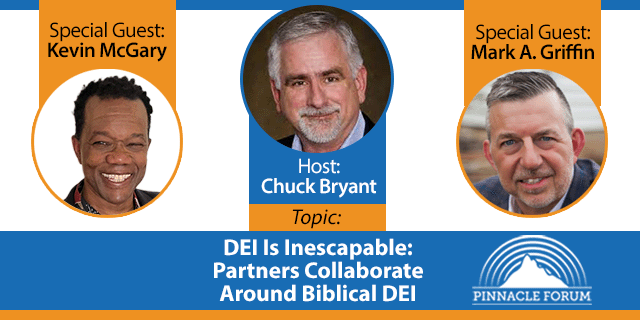
Aug 21, 2023
Diversity, equity, and inclusion (DEI) might seem like a new concept, but it’s actually been around for a long time. It’s just that the content has changed over the years, with the fundamentals of today’s DEI programs being built on Marxist teachings.
On the surface, the resulting structure has the appearance of leveling the playing field. But the outcomes have actually been shown to be divisive.
Listen in as Kevin McGary and Mark Griffin come together to discuss an alternative to that script through biblical DEI. Kevin shares information from his book, WOKEd UP! and Mark shares more about his DEI certification program. Together, their efforts provide a standard that celebrates differences and human connectedness in a much more accurate and effective manner.
Kevin and Mark also discuss how they met through Pinnacle Forum, which was inspired by Dr. Bill Bright, founder of Campus Crusade for Christ International. Dr. Bright challenged a handful of leaders in 1995 in Phoenix, Arizona, saying, “I believe the only way we can change our culture is to find a way to network our high-influence leaders and inspire them to use their influence for God.”
Join Them Here!
Kevin McGary is an entrepreneur, author, and public speaker. Kevin serves as co-founder of Every Black Life Matters (EBLM) and as chairman of the Frederick Douglass Foundation of California. His background, passion, and keen observations about the momentum of dramatic changes in culture and society all shine through WOKEd UP!, the fifth book he’s authored. All of his previous books delved into the arenas of politics and theology. But WOKEd UP! is strictly designed to combat the many powerful forces producing overarching influences seeking to detach global populations from positive morals and traditions.
Host Chuck Bryant has served with Pinnacle Forum since 2005 and is currently serving as its president and CEO. Chuck has held a few instrumental roles with Pinnacle Forum, first as executive director of Pinnacle Forum Modesto in California and then on the national board as well as board chair.
Download and Listen on iTunes Here
Mark A. Griffin is paving the way for employment opportunities without fear of religious discrimination even as the government seeks to reshape the business landscape. Mark stands in the gap and lives out his Kingdom mission by providing an alternative Bible-based DEI program for Christian nonprofits, churches, ministries, and camps. He also serves Christian-owned for-profit organizations looking for wiser choices in this space.
Listen in and glean beneficial information for your organization. You can contact Mark through his website, inhisnamehr.com, or find him on Twitter @inhisnamehr.
Mark A. Griffin | Christian Higher Ed HR, Human Resources, Podcasts

Jul 21, 2023
Presented and hosted by Christian Business Partnership Ohio’s Christian Chamber of Commerce.
Restoring the American Promise. Together.
3PM EST Tuesday, August 22nd, 2023
HR practices that can best help your “Kingdom-Minded” organization and business protect its mission in today’s hostile world.
Click Here To Register
Presenter Mark Griffin has seen it all in his more than 25 years of Human Resources experience gained by working with a wide range of organizations, from small businesses to Fortune 500 companies to Christian Colleges, Ministries and Churches.
Let Mark help you by sharing his experiences in helping a variety of organizations manage their beliefs in the reality of today’s workplace.
Leading an organization with Christ-centered values makes organizational sense.
Mark will share why he believes Christ-centered organizations experience:
- Lower absenteeism
- Higher quality products
- Fewer employee morale issues
- Safer work environments
- Better perceptions by customers and vendors
Mark will also share how he helps organizations develop HR practices that reflect their core values and still build a high performance organization.
Topics to be Covered
- DEI and Biblical alternatives why is this important?
- Protecting your religious liberty
- Dangers from proposed laws
- Current state of religious liberty in court
- Creating a high performance culture through practical HR competency development
Click Here For Tickets
About The Host
Christian Business Partnership exists not only to defend your rights in the economy, but to ensure a business environment friendly to businesses throughout Ohio. Their mission is to aggressively advocate for the religious liberty of Christian employers and for a fair and free marketplace that enables entrepreneurs to thrive and compete. Learn more or join here!
About The Presenter

Mark A. Griffin, MBA
President and Founder In HIS Name HR LLC
Mark is a human resources professional with 25-plus years of experience in both public (Quaker Oats Company, Kodak Inc., Merck Inc.) and private companies (Woolrich, Conestoga Wood Specialties, Valco Companies Inc.), Mark is passionate about building high-performance workplaces by utilizing best practices while leading organizations with strong values.
Speaker, accomplished HR consultant, and the author of How to Build “Kingdom-Minded” Organizations and College to Career: The Student Guide to Career and Life Navigation, Mark A. Griffin encourages leaders to build values-led organizations during these increasingly complex times. Mark and his wife live in Lancaster PA and have two adult children.
Mark A. Griffin | Blog, Christian Higher Ed HR, Events, Human Resources, Kingdom Company Building
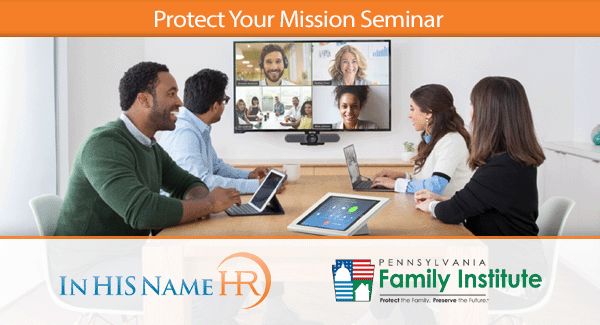
Jul 5, 2023
HR practices that can best help your “Kingdom-Minded” organization and business protect its mission in today’s hostile world.
The Junction Center
1875 Junction Rd,
Manheim, PA 17545
September 7, 2023
9AM-1PM
Lunch Included!
Click Here For Tickets
Presenter Mark Griffin has seen it all in his more than 25 years of Human Resources experience gained by working with a wide range of organizations, from small businesses to Fortune 500 companies to Christian Colleges, Ministries and Churches.
Presenter Randall Wenger Esq. has a myriad of experiences from all his years of working on religious liberty cases in Pennsylvania including the Conestoga Wood Specialties case that resulted in a landmark victory in the US Supreme Court for religious liberty and the sanctity of life. Randy understands the pressures and dangers that are facing those who want to run their businesses and organizations in line with their Christian values.
Let Mark and Randy help you by sharing their experiences in helping a variety of organizations manage their beliefs in the reality of today’s workplace.
Leading an organization with Christ-centered values makes organizational sense.
Mark will share why he believes Christ-centered organizations experience:
- Lower absenteeism
- Higher quality products
- Fewer employee morale issues
- Safer work environments
- Better perceptions by customers and vendors
Mark will also share how he helps organizations develop HR practices that reflect their core values and still build a high performance organization.
Topics to be Covered
- DEI and Biblical alternatives why is this important?
- Protecting your religious liberty
- Dangers from proposed laws
- Current state of religious liberty in court
- Creating a high performance culture through practical HR competency development
- Where most organizations go wrong engaging employees
- Setting expectations
- HR tools for creating success
- Employee policy manuals
- Codes of Conduct
- Employee relations and communications
- Performance management
- Counseling and discipline procedures
- Terminations
- How the Civil Rights Act administrative guidance affects your business
Click Here For Tickets
Map To The Junction Center (Map)
About The Pennsylvania Family Institute
The Mission of the Pennsylvania Family Institute is to strengthen families by restoring to public life the traditional, foundational principles and values essential for the well-being of society. It is the only full-time professionally staffed non-profit organization representing family values—your values—in the state capitol. It encourages responsible citizenship and involvement in civic affairs to promote respect for life, family, marriage and religious liberty.
About The Presenters

Randall L. Wenger, Esq.
COO & Chief Counsel
Randall Wenger is Chief Counsel of the Independence Law Center in Harrisburg, a pro-bono law center affiliated with the Pennsylvania Family Institute and dedicated to maintaining those liberties that have made America great and free. He has litigated in federal courts all around the county, and his cases have included the free exercise of religion, freedom of speech, bodily privacy, and pro-life issues. In addition to his role with the Independence Law Center, he is COO of the Pennsylvania Family Institute.
Randall has an economics degree from the University of Chicago and earned his J.D. at the University of Pennsylvania. He lives in Lancaster County, and he and his wife Tina have seven children.

Mark A. Griffin, MBA
President and Founder In HIS Name HR LLC
Mark is a human resources professional with 25-plus years of experience in both public (Quaker Oats Company, Kodak Inc., Merck Inc.) and private companies (Woolrich, Conestoga Wood Specialties, Valco Companies Inc.), Mark is passionate about building high-performance workplaces by utilizing best practices while leading organizations with strong values.
Speaker, accomplished HR consultant, and the author of How to Build “Kingdom-Minded” Organizations and College to Career: The Student Guide to Career and Life Navigation, Mark A. Griffin encourages leaders to build values-led organizations during these increasingly complex times. Mark and his wife live in Lancaster PA and have two adult children.
Mark A. Griffin | Blog, Christian Higher Ed HR, Events, Human Resources, Kingdom Company Building
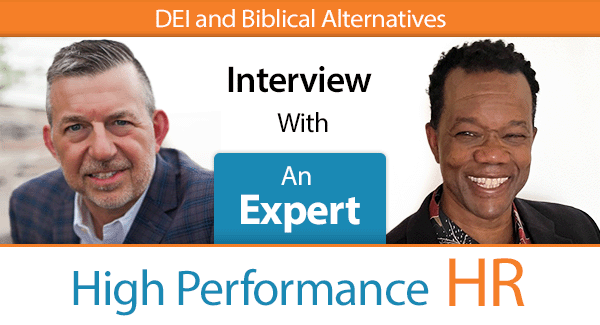
Jul 5, 2023
Diversity, equity and inclusion, or DEI, has become a very popular topic in the last few years. Recently, I had the pleasure of spending time with Kevin McGary, a leading thought expert on diversity, equity and inclusion. Kevin has been pivotal in our quest to develop a Biblically based DEI program that celebrates human connectedness and offers recipients hope and unity by aligning all people’s strengths, and reinforces that no one person’s pain is greater than another’s. I also consider Kevin a good friend.
I was blessed to meet Kevin through the Pinnacle Forum group. Pinnacle Forum was created to help connect C-Suite-level executives into groups that allows them to support each executive in their sphere of influence as it relates to their walk with the Lord. Kevin is the chairman of the Frederick Douglass Foundation of California and brings to us an enlightened viewpoint on what is happening, societally, within the United States. Much of this I have witnessed through my HR experiences the past 30 years, as we have seen the deterioration of the family, and, in return, the deterioration of the workplace in general.
While many Caucasian and Black leaders shy away from discussing uncomfortable, difficult issues, Kevin and I want to share some of our collective experiences as, respectively, a Black man and a Caucasian man living in America to generate greater understanding of these difficult topics from our distinct perspectives.
While Kevin and I do not share the same skin color, we do share the same frustrations with the current happenings in our society. We certainly don’t want to politicize the situation, but we are finding it increasingly difficult to bring our country together. From my perspective, I wonder how Black Americans do not see the destruction that the Democratic party has created in their community, specifically in regard to NAFTA and its promotion by the Clinton administration. Taking tens of thousands of jobs out of the cities disproportionately affected the Black community and never made sense to me. I recall, in grad school, being told that we were “evolving to a more tech-centric economy.” Well, as we know, most of those tech-centric jobs ended up in third world countries, where wages are nowhere near as much as they would be in the US.
Not only did we lose jobs as a country, but those jobs went to places that don’t have the same child labor laws and green laws that we have enacted in America. I have been to India and witnessed the impact on their people and their environment. Sadly, many employees in India working for American companies do so on work campuses, sending their wages back to their respective villages to support their families. This doesn’t cause prosperity; this breaks up families and creates more pain. A much better approach could be to develop work locally and support that work with microfinancing. Much of the manufacturing that formed the backbone of our country fed tens of thousands of families and gave dignity to those who work there. Without work, where are people to gain dignity? Work is Biblical. Adam and Eve had jobs in the Garden of Eden. And, someday, we will all be using our gifts, talents and strengths in eternity with Christ.
Mark: Kevin, my question is simple. What changes have occurred that have put Black Americans at a major disadvantage in terms of prosperity here, in the US? My thinking always goes back to the deterioration of the family. The lack of the presence of two loving parents and even the lack of loving grandparents has caused so many issues with our youth. I am curious to know your opinion.
Kevin: The deterioration of the Black family is definitely a factor. But even before LBJ’s proclamations and policies specifically designed to undermine the Black family unit—remember, LBJ is recorded as having said his policies “will have the n***ers voting democrat for the next 200 years
Notably, Charles Darwin believed whites fully evolved first and were “superior” (i.e., possessing “supreme” human attributes and instincts), while Blacks were still climbing the evolutionary scale (foremost in his theories) and, therefore, he wrote, must be considered “subhuman.” He equated Blacks to apes, gorillas, and savages. In my book Woked Up! Finally putting an ax to the taproot of White Supremacy and Racism in America, I confirm that Darwin was motivated by grotesque and arcane theories of supremacy and racism. Since he was the first world-renowned scientific mind to make such assertions, I deem that Darwin’s theories are singlehandedly responsible for the disproportional abuse that has plagued and stymied Black progress for over 100 years. Having a cursory understanding of Darwin and his motivations provides context for why Blacks had to demand justice and equality, culminating in Dr. Martin Luther King’s demand that the content of character must be the overarching focus for human interactions. White people weren’t judged by their skin tone, so it wasn’t color that actually mattered: Black people’s skin color was seen as a mark of evolutionary inferiority.
Mark: And have these issues caused you to accelerate your involvement in movements against the current direction of our country?
Kevin: I am most certainly motivated to get involved in changing the socio/cultural downward trajectory of America! Unfortunately, Darwin and his protégé, Karl Marx, are still lauded and applauded globally. Their diabolical deeds to inculcate supremacy and racism have been largely ignored. Most people don’t fully comprehend the extent to which their theories have been motivated to instantiate grotesque “White Supremacy” and racism. My motivation is to make sure that people come to know the truth, so we all may be set free from these insidious mindsets.
Mark: This 1993 article from The Washington Post called out issues impacting the Black community. And this article from the Economic Policy Institute, written in 1997, cites the immediate impact that NAFTA had on American jobs, notably within just the first three years after the Agreement was enacted:
“Between 1993 and 1996, women lost 141,454 jobs to NAFTA, Blacks lost 36,890 jobs, and Hispanics lost 22,520 jobs, numbers closely reflecting these groups’ shares in manufacturing industries. Moreover, a disproportionate number of the jobs eliminated by NAFTA were manufacturing jobs, which pay relatively high wages, further contributing to NAFTA’s detrimental effect on the distribution of income and wages of working Americans.”
These are big numbers. I remember working in the garment industry during those years and the devasting plant closures that ensued. I watched one industry after another shift manufacturing overseas. I support all people in the world having the dignity of work. I have done mission work in Ukraine, Haiti, Dominican Republic, Honduras, and Nicaragua, and I believe the only way out of poverty is through the dignity of a good, safe job. The difficulty lies in the jobs that have left, which have never been replaced with equal- or higher-paying jobs. We are seeing a deterioration of the workforce, not an increase in our capabilities. Finally, this article outlines the impact 25 years after the passing of NAFTA:
“According to the U.S. Bureau of Labor Statistics, Black workers have lost nearly half a million manufacturing jobs (494,000) during the NAFTA–WTO era. Black workers’ manufacturing losses were evenly spread across many subsectors that suffered significant trade-related job loss. For instance, in the automotive sector, by 2010, in just the first 15 years of NAFTA, Black workers had lost 56,524 jobs. Black workers were disproportionately represented in the primary metals manufacturing sector hit by the NAFTA–WTO era with a loss of 53,800 jobs. Black workers have also lost 22,100 jobs in the paper manufacturing industry and 18,600 jobs in the beverages and tobacco industry during the NAFTA–WTO era, two more sectors where Black workers were overrepresented relative to their general share of the workforce.”
Kevin, with these staggering statistics in mind, what suggestions do you have to reinforce that we need change to return dignity to people, but not through policy or the extension of destructive governmental programs that hinder an individual’s freedom to prosper?
Kevin: Some of the best ways to encourage the dignity of work and beget progress for any/all communities would be to reemphasize the trades! Higher education creates very high student loans and can be more burdensome (long term) than not. Skilled trades, on the other hand, continue to be in demand; most trades have proven to be “recession resistant” (resilient to economic conditions). Trades like HVAC, construction, machinery, auto mechanics, landscaping/design, etc., provide high incomes and opportunities that are mostly resistant to economic downturns. Entrepreneurship is greater for tradespeople. Also, unlike trying to “climb the corporate ladder” via “white-collar” jobs, meritocracy is more apparent in the trades arena. Therefore, people tend to achieve greater income acceleration and promotion based on skills/mastery of craft, as compared to the subjective criteria of the corporate world.
Mark: The privatization of prisons and the extreme zero policy of Democratic leaders caused a disproportionate amount of Black men to be incarcerated for de minimis amounts of drugs and narcotics in their possession. We know that the sentencing guidelines for crack cocaine offenses versus powder cocaine were changed. This article from 1995 highlights those issues. Yet again, we trust our politicians to make the lives of our people better. This subject has been in my heart for many years. Privatizing a penal system and then decreasing the threshold of incarceration would seem, to me, to reek of impropriety. But what would you advise both the Black and Caucasian communities to do in this regard?
Kevin: There is a serious need for continued criminal justice reforms initiated under the Trump administration. With Joe Biden’s racist 1994 “criminal legislation,” Blacks were targeted and put behind bars for 25+ years for relatively minor offenses.
Judges were given great latitude as well, and this translated to large variations in sentencing; depending on the city, state, and court/judge, sentencing would vary from probation to 25+ years for the same crime! This must stop. Irrespective of where criminals decide to break laws, all criminals should know the minimum consequences for committing crimes!
Across the country, there should be consistency in sentencing guidelines. Too much power is given to DAs and judges (in certain cities), and this phenomenon has caused “woke” social justice warriors to champion over-correction on criminal justice reforms. To be sure, many cities have now implemented no-cash bail reforms (which provide a no-consequence revolving door for repeat offenders), and defunding of the police, which has allowed and encouraged many criminal activities to go unpunished.
Common-sense reforms that provide minimum sentencing requirements for all states will help restrict subjective rulings from radical judges, while also providing consistency.
Mark: Organizations now actively seek ways to create a more welcoming workplace that respects employee diversity and gives a voice to people who are often underrepresented. Whether you are a Christian-owned business or a religious-exempt employer, such as a Christian church, ministry, higher education institution, or camp, many foundations and organizations that provide grant dollars are mandating DEI. It is rumored that more and more local, state, and federal contractors that provide services to the federal government must certify that their employees have been trained in DEI.
Fortunately, we live in America, and there is no one authority that can dictate the contents of this mandated training. Many employers have sought an alternative to present, rather than the highly sexualized versions that consulting companies deliver. As an HR professional, it’s challenging to reconcile these mandates when much of the presented materials would violate current sexual harassment and workplace employment laws.
We believe that business owners and organizations can create the thriving work environment they aspire to by implementing our Bible-based, organization-wide DEI training program. In fact, much of its content aligns with the DEI training that was presented in corporate America in the ’90s. Some of the points, although presented from a secular worldview, mimic the Biblical worldview. For example:
All people are created equal.
So God created human beings in his own image. In the image of God He created them; male and female He created them. – Genesis 1:27
There is no longer Jew or Gentile, slave or free, male or female. For you are all one in Christ Jesus. – Galatians 3:28
The rich and poor have this in common: the Lord made them both. – Proverbs 22:2
God sees everyone as the same.
For God does not show favoritism. – Romans 2:11
Treating all people fairly is paramount.
Yes, indeed, it is good when you obey the royal law as found in the Scriptures: Love your neighbor as yourself. But if you favor some people over others, you are committing a sin. You are guilty of breaking the law. – James 2:8–9
The second is equally important: Love your neighbor as yourself. No other commandment is greater than these. – Mark 12:31
God loves everyone.
“The mountains may shift, and the hills may be shaken, but my faithful love won’t shift from you, and my covenant of peace won’t be shaken,” says the Lord, the one who pities you. – Isaiah 54:10
The Good News: No matter how the world changes around us, or what trials we face, HE is always there, guiding us through it all.
In a nutshell, God loves diversity, equity, and inclusion. Jesus set the example, so we should, as well. In addition to honoring Him, organizations promoting inclusive cultures provide a happier, healthier work environment. Indeed, according to a Deloitte survey, companies with inclusive cultures are twice as likely to meet or exceed financial targets; three times more likely to be high performing; six times more likely to be innovative and agile; and eight times more likely to achieve better business outcomes.
Inclusive companies also produce more satisfied employees. This same survey revealed that employees in these environments were likely to stay with the company three times longer, be 28% more engaged, and were 51% more likely to recommend the company to others. For 80% of individuals surveyed, diversity, equity, and inclusion remain a hugely important factor when committing to a workplace.
Robert Sellers, chief diversity officer at the University of Michigan, compares diversity, equity and inclusion to a dance: “Diversity is where everyone is invited to the party. Equity means that everyone gets to contribute to the playlist. And inclusion means that everyone has the opportunity to dance.”
Kevin, with this being said, what is your perspective on aligning the Biblical view with DEI versus the world view, and where do you see the critical differences?
Kevin: In my book DEI in 3D, I affirm that “the most significant value of Diversity for any environment is the encouragement of divergent viewpoints; this helps promote harmonious flourishing when focused on solving problems or attempting to accomplish an objective. Actively welcoming criticisms and coordinated assessment of different plausible solutions increase the Diversity of ideas within organizational thinking. If all organizational contributors feel their input and perspective are encouraged, honored, and respected, it can foster a rich unifying experience for employees. When corporate unity is increased, an increase in overall corporate performance should accelerate. From an in-depth DEI in 3D view, a sincere and concerted effort encouraging equal opportunity for people with diversified skillsets, political leanings, ethnicity, sex/gender, etc., is needed to produce a ‘melting pot’ of Diversity to achieve a pipeline of opportunistic successes.” This aligns with the Biblical view of the Kingdom.
A secular view of DEI emphasizes equity. Within today’s DEI parlance, the equity focus connotes that since everyone is accepted as equal, there is demand for equal pay and promotion outcomes (regardless of skillset, background, competencies, etc.). Taken to its obvious extreme, equity demands that people be promoted and placed into senior positions based solely on skin color (or gender identity, like trans). Equity, when reflected as equal outcomes, allows incompetent people who are abject failures to be rewarded with high pay and promotion. This is quite divisive, because it enables personal retribution (if someone lacks melanin, for instance, and the DEI exec despises them for it, they can be displaced in deference to someone less competent). This obviously doesn’t allow a menagerie of flourishing in a diverse workplace. Instead, is causes distrust, division, and resentment. Workplaces should be vigilant about diversity, while also emphasizing a commitment to merit/meritocracy, not “equal outcomes!” This—equal outcomes—is fundamentally a communist notion and should be rejected by all who believe in equal opportunity, fairness, and promoting unity.
Mark: Kevin, we discussed some of my firsthand experiences witnessing prejudice. Growing up in a predominately white community, for example, I did not, early on, have the opportunity to work closely with people of color in a for-profit secular company environment—I had experienced some of this during my time in the Air Force, but not with anyone at a high level in corporate America. But then I took a job at a Fortune 500 company where my boss was a very successful Black man who had risen to the top of this company very quickly, and I was learning so much from him. One day, we were having lunch together at a steak house, and when the subject came up, I admitted I had never witnessed anyone white acting or sounding racist or bigoted. My boss said that racism still very much existed, and that if I hadn’t seen it, I wasn’t looking very hard for it. That made sense, because why would I be looking for the negative all the time, given I tend to assume the best about people when I meet them? At the end of the meal, the waiter brought me the check, assuming I was senior to my Black companion. My boss grinned. “Case in point, Mark. That is a subtle form of racism.” I learned my lesson that day, as it might otherwise never have registered.
Kevin, how do you see this from your perspective? That lunch was many years ago. Has it gotten better for the Black community? What would you recommend the Caucasian community, as well as the Black community, do to shine a light on things like this? How can this discussion become healing and unifying, rather than destructive?
Kevin: Racism exists! Preconceived notions, based on race, also exist. Preconceived notions (devoid of malice) should not be conflated with racism, which, in my opinion, always includes malicious/malicious intent.
We must give one another grace based on the fact there is much ignorance about changing norms and precedence. Given that personal biases based on preconceived notions tend to become visible, we must allow for this as a plausible explanation of insensitivities and ignorance, as opposed to immediately “knee-jerking” to race/racism. When we (everyone) can learn to do this, we can begin to build a basis for achieving some level of trust and unity.
Mark: Another topic we discussed, Kevin, is law enforcement. This has been a hot topic in the press for the many years, starting with Rodney King, and now particularly on the heels of the very controversial George Floyd riots. We have seen many instances these past several years that show mounting frustration and tension in our nation. People have widely differing perspectives, with some believing that defunding the police is the solution. But we have to agree that not funding the police is backfiring. I was recently in San Francisco on vacation and was shocked at the crime and the appearance that has taken over the city. Automobile break-ins are rampant, assaults on citizens are increasing, and several areas are overrun with drug abuse and homelessness. And it’s not just California. Parts of Baltimore, Detroit, and Philadelphia are unrecognizable now, in contrast to the prosperity they demonstrated in the past.
This article outlines where many of the problems stem from, and much of it sadly has to do with reduction in our police forces. When police pull people over, it’s important to be respectful, but we also expect the police to be respectful toward, albeit cautious of, the citizens they encounter. We have a court system that can help us in the event an officer is abusive. Most police now have body cameras, and if they are abusive, their actions will be recorded. Even comedian Chris Rock, who uses some salty language to give guidance, believes that respecting law enforcement is in one’s best interest.
Kevin, what recommendations would you give to our readers to help prevent these kinds of issues from continuing?
Kevin: Everyone should rally around the FACT that we need law enforcement. Too often, officers are needed to intervene in domestic violence incidents, rape/assault investigations, terror/terrorist actions, and countless other ways that help protect and save lives! Let’s face it, there are rogue nut jobs in every profession; the law enforcement profession is certainly not exempt. For officers who have proven to be “bad,” we need to demand dismissal. Regrettably, police unions are complicit in retaining bad officers. One answer is to reduce the power and privilege of police unions when there is a track record of officer abuses/misdeeds.
With U.S. borders currently “open” and people from all over the world streaming in (some confirmed terrorists, some confirmed human and sex traffickers, and countless drug/gun-running lords), reducing law enforcement is not an option. Only sincere efforts to increase law enforcement mechanisms will help protect all citizens (especially those in inner-city communities). We must be vigilant about encouraging more law enforcement, while being diligent about holding them accountable to standards of conduct conducive to public safety and personal well-being.
Mark: The second point to discuss is the case of an affluent Caucasian man who runs over a man, obstructs the investigation with false claims, is let out on bail, and then receives a sentence of a minimum of 363 days and a maximum of three years for an accident involving death or personal injury. Furthermore, from our understanding, he retained his employment and is out daily on work release. This just doesn’t seem right. I am curious: Had the driver been a Black man from Philadelphia driving through central Pennsylvania in a predominantly white community, what might the outcome have been? This strikes me to be what some call white privilege. In this case, access to quality legal assistance, to local officials, and certainly the privilege involved with this person’s influence in the community, all played a part in the outcome.
What has been your experience in this area? What would you like to share with both the Caucasian and Black communities as to how we can better ensure that the justice system treats all offenders similarly?
Kevin: As stated before, minimum sentencing guidelines are needed; this helps remove subjectivity from the meting out of so called blind justice. Judges would not be able to bend the rules to help friends/family or their favorite (or preferred) ethnicity.
Mark: Thank you for that answer; that would solve many of these issues for sure. Kevin, my heart breaks when I see great Americans like Condoleezza Rice, Candace Owens, Ben Carson, and Burgess Owens being vilified by the media and the left-leaning agenda. These are role models who should be lifted up, rather than torn down. What can we do collectively to help elevate them, rather than witness them become marginalized?
Kevin: On the issue of Black conservatives being marginalized and silenced in many ways, the best way to stop abuses of dissenting voices (on both the right and left) is to recognize everyone’s humanity, and in that, dignity and worth. When we can come to the point where we can respectfully disagree without name calling, we will see opportunities to unify around the things that really matter. Honestly, we will not be able to come to this point until we recognize the evil of Marx/Marxism, and commit to thoroughly rejecting him and all of this ideology. Marxism is wholly corrosive and violent, and because of its global mass appeal, people have gotten more divisive and aggressively violent against those who dissent.
Freedom-fighting Blacks standing for righteousness, truth, and justice are elevated and supported best when we reject mainstream Marxist media. If we reject the communists in the media, we can go much further in unifying real truth and justice.
Mark: I put myself through college by working full-time and going to college full-time, at night. I didn’t enjoy the privilege that some assert all white people have. In addition, and this is a hard topic, I spent many years in corporate America being told that I would never rise to the senior ranks of a corporate company on merit, because Blacks and women were being promoted within the ranks of HR to fulfill affirmative action requirements. If I wanted to rise, I was told I would need to go into Operations, where I would have a better chance; otherwise, no matter what I did, I would not reach those ranks. I‘m not angry about it—I understand it. I actually was blessed by it, because not only did it give me a greater understanding of affirmative action but also the motivation to start my own company.
Kevin, what’s your perspective on affirmative action in the United States? Has it helped? Or has it hurt the people it was supposed to help?
Kevin: When it was initiated, affirmative action was needed to help Blacks—finally—get equal opportunities to succeed. Coming out of the civil rights era, it did what it was supposed to do. But it wasn’t intended to continue in perpetuity, so there is no rationale for its continuance. We
each need to be more intentional about recognizing and honoring one another based on the content of character, and not skin color; when we unify—one human to another—we represent God’s design for humanity and are provided a glimpse of the menagerie of diversity that will be harmoniously reflected in His Kingdom.
Mark: Thanks so much for giving us your thoughts on affirmative action. We certainly appreciate your pointed and direct feedback on a discussion that has been debated for many years. I appreciate your wisdom
My final question concerns the Black Lives Matter movement. Many people were very excited about this movement and moved quickly to support it. At the end of the day, though, what is well intended does not always come to a positive fruition. What have you seen regarding this program, and what’s next for it?
Kevin: BLM, as a motto, was something everyone could get behind. But BLM as an organization was a mess. It has now been deemed a fraud. Multiple mansions, very high-income family members, and appreciable contributions to Act Blue (and transgender organizations) are where they spent approximately $1 billion. Multiple states have sued BLM for fraud, and BLM has virtually ignored Black communities; no Black communities received help, support, or were aided in any way after the George Floyd riots. The BLM organization seems to have been established as a mechanism for unfettered graft and defrauding the public, not help!
The BLM founders are proud “revolutionary Marxists”—their proud proclamation—so I guess the fraud and malfeasance is to be expected….
Mark: Kevin, I want to thank you today for taking the time to help our readers get a greater glimpse of race and DEI, which is often presented in a different manner. Have I missed any areas you think we should discuss?
Kevin: To address issues with DEI and have it work in positive ways (in which it’s anticipated), the first thing I would recommend is to read my new book, DEI in 3D. It provides a healthy, cogent, and objective view of DEI and its anticipated outcomes. The second thing I recommend is to completely reject and denounce Karl Marx and Marxism. Marxism is wholly antithetical to morals and values, unity, and a proper and healthy respect for all humanity. Marx and his theory must be canceled! This is not optional; it is mandatory for those who are sincere about workplace (or small group) harmony.
Mark: Kevin, thank you for taking the time to discuss DEI and Biblical alternatives with us. The conversation took longer than we’d thought, but your perspective on the many points we’ve covered has been very valuable. Your wisdom and understanding will help many who were unaware of these potential risks in what is happening, societally. Thanks again!
Mark A. Griffin | Blog, Career Coaching, Christian Higher Ed HR, Human Resources, Inspiration, Kingdom Company Building
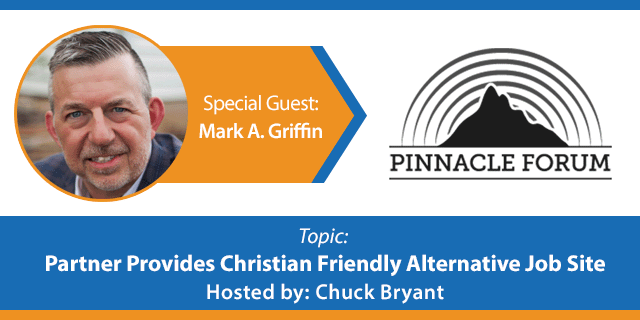
Jun 12, 2023
Enjoy listening to Guest Mark A. Griffin as he discusses “Job Shepherd, a Christian Friendly Alternative Job Site” with host Chuck Bryant.
Pinnacle Forum was inspired by Dr. Bill Bright, Founder of Campus Crusade for Christ International, who challenged a handful of leaders in 1995 in Phoenix, Arizona saying, “I believe the only way we can change our culture is to find a way to network our high influence leaders and inspire them to use their influence for God.” Join Them Here!
Chuck Bryant has served with Pinnacle Forum since 2005 and is currently serving as President & CEO. Chuck has held a few instrumental roles with Pinnacle Forum, the first as Executive Director of Pinnacle Forum Modesto in California. He then served for a few years on the National Board, as well as in the role of Board Chair.
Download And Listen On iTunes Here
Partner Mark A. Griffin is paving the way for employment opportunities without fear of religious discrimination as the government seeks to reshape the business landscape. JobShepherd.com is currently available for free for job seekers and employers who want to ensure they are landing in healthy environments. Mark also lives out his Kingdom mission by providing an alternative biblically based DEI program for companies and organizations. Listen and glean beneficial information for your organization. You can contact Mark through his website: inhisnamehr.com or find him on Twitter @inhisnamehr. Mark Griffin’s bio.
Mark A. Griffin | Christian Higher Ed HR, Human Resources, Podcasts
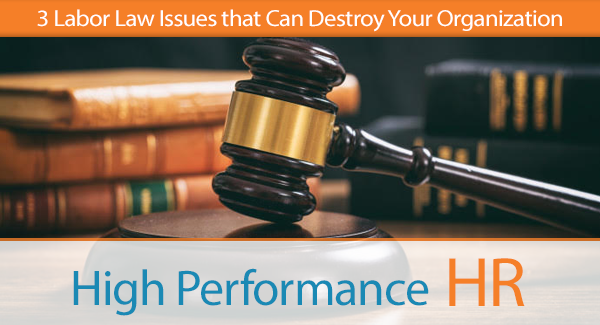
Jun 10, 2023
Are you complying with all the proper state and federal labor laws?
If not, it could cost you everything.
In large corporations, an entire human resources (HR) department navigates the complex minefield of federal and state labor laws. Most small organizations think of HR as an afterthought, or HR responsibilities like hiring, benefits, compliance, and payroll falls to a few people who aren’t properly trained. This can be a pricey mistake. Laws concerning overtime, unlawful termination, and equal rights are just a few areas that trip up organizations, big and small, all the time.
Labor laws fill volumes and are quite complex. Plus, labor laws vary from state to state! Even Walmart ran into trouble recently and incurred $4.83 million dollars in back wages, penalties, and fines for violating The Fair Labor Standards Act. The mistake? Managers were misclassified and not appropriately compensated for overtime work. Unlawful termination is another problem that has cost organizations like UPS, Carmike Cinemas, and Dial Corporation dearly. Yes, it’s tricky. Do you know the laws?
It gets worse—the government is ramping up efforts to check up on organizations and crack down. The Obama administration has allotted $25 million for the sole purpose of investigating those misclassified as “independent contractors,” hoping to reclaim lost tax revenue and pad the IRS’s coffers. Be smart. Remember that stiff penalties and lawyer fees can decimate your organization. Are your workers properly classified?
Stay legal and remember these 3 key points:
• Child labor, non-resident labor, and equal rights legislation are the three areas where small organizations most often fail to comply.
• Both state and federal labor information is free and available online.
• Outsourcing with an HR professional firm can save your organization a lot of time and money.
Most organizations with fewer than 100 people benefit from outsourcing labor law compliance and other human resource tasks to HR professionals. The alternative is risky: employees are often uninformed about and under-trained in labor law compliance. Look out! Federal fines could be in store for you. In addition, HR often falls outside an employee’s main job focus, so getting it wrong or spending valuable time away from primary tasks can cripple productivity in a small organization. Get the right person trained or on your team to comply with labor laws.
Regrettably, staying legal has never been more difficult or important.
Make sure to get the help you need right away.
##
Mark Griffin is President and Founder at In His Name HR LLC. He has over 25 years of HR experience. Learn more about Mark’s journey in HR by watching this short video. In addition you can also follow him on Facebook, Twitter and LinkedIn.
Mark A. Griffin | Blog, Christian Higher Ed HR, Human Resources

















